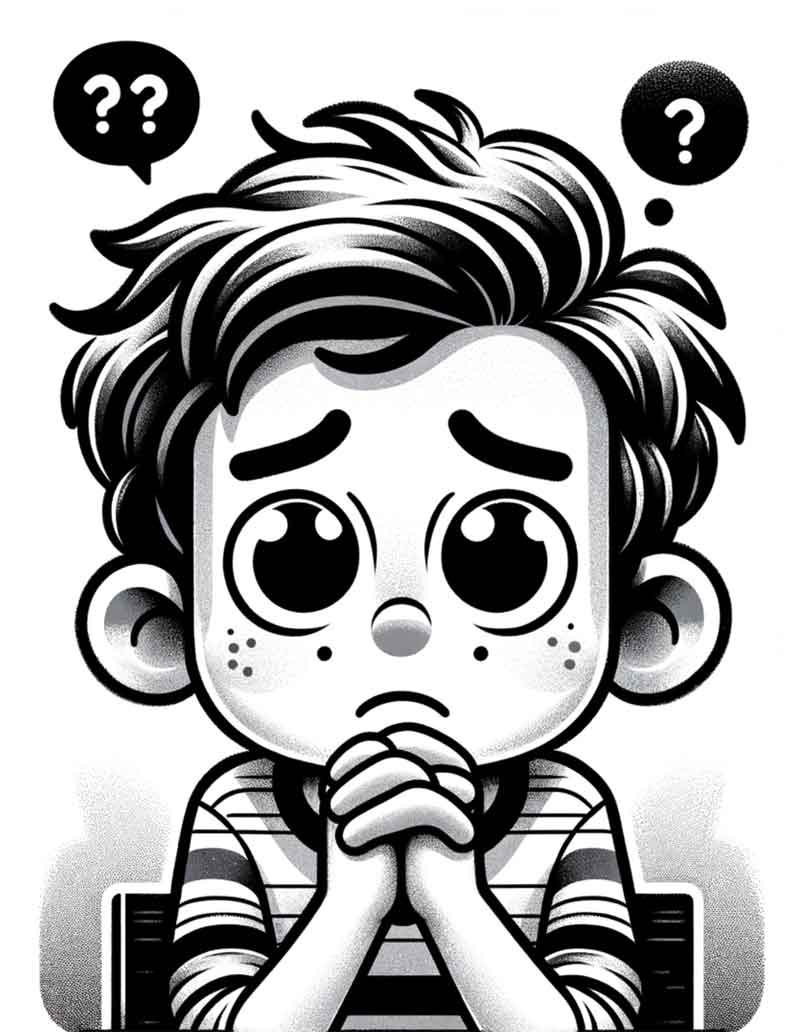When a Sibling Illness in the Family Causes a Child Anxiety
I wrote a different page concerning the range of anxieties your child might be experiencing if they’re the one with an ongoing illness or condition. Here, I’ll turn to helping your other child or children thrive when there’s sibling illness in the family.
Issues when your child faces sibling illness in the family

Let’s review the possible effects of one child having to face the fact that their sibling is ill or has an ongoing condition that requires a lot of care and attention from you as parents.
One way this can help when there is sibling illness in the family is simply to sort out all thoughts and possibilities so you have it clear in your mind and can check you’re making any necessary adjustments so that all your family thrives. Sometimes, there seems to be no time to just stop and monitor things!
So – the effects on your other child or children can include these things:
Distraction from developmental tasks
They may be find themselves distracted from the business of growing up that's appropriate for their age. For example, instead of growing closer to teachers and friends (and disrgarding your views, as they do at a certain age!), they may be constantly worried about what might be going on at home or with their sibling.
Attention lapses at school
They may then find that their attention is lapsing in class and they’re either getting told off or receiving worse marks for their work than they deserve in light of their level of ability. For example, in certain subjects it’s neessary to grasp each learning point in order or you cannot proceed well to the next (think Maths!). When they find something difficult, it will make them anxious realising they must have missed out on something crucial when “absent mentally”.
Compromised socialising
They may find they're not able to socialise in the same way other children do. Maybe their friendship group meets when they have to be home helping you. Or maybe the other children know there’s sibling illness in the family and treat your child differently (out of care and concern, of course) – but this alters normal give-and-take actions in relationships, that your child needs to learn to deal with.
Less parental time
It’s possible that, despite your best intentions, there is an erosion of time that you can spend with your child because of your healthcare responsibilities to your other child. Your healthier child will maybe understand this, according to their age, but it’s valuable time that they need with you. When this is lacking, they don’t have the freedom to alternate between relying on you for sudden support and going off to adventure without you. Which is the normal way of things as they grow up.
Excluded from – or over-included in – caring
Your child can sometimes feel excluded from the inner circle of those caring for the sibling in the family with an illness or condition that needs attention. You obviously don’t want to include them in every adult discussion with medical people and carers (if involved) and you do want to protect them from always having to be involved with their sibling. It’s a balancing act, as all aspects of parenting are! And if they don’t feel excluded they can sometimes resent that they have to help in the caring role when others are out playing.

All these factors can lead to the development of anxiety in your child when there’s sibling illness in the family.
Why? Because your child knows they should not be reacting as they realise they are sometimes. They perhaps feel guilty at being well, or feel resentful of their situation. Whatever, it is a good idea to bear all these things in mind and find some solutions that will at least help, in as far as lessening anxiety goes.
What solutions can you use to lessen anxiety in this situation?
1 Quality communication has to be uppermost.
According to how old your child is, share what can be shared, over time if that’s best, so they hear what they need to hear from you. And, conversely, use any of the techniques on this website to help you listen and really hear how things are for your other child or children.
They won’t tell you outright for the reasons mentioned. So you act as a detective and pick up clues that you can follow up in different ways! When your child feels heard, they're less anxious because someone has their back. Thus, they actually manage better!
2 If you can consciously find even small amounts of time to be alone with each child, that will help.
The idea here is to pursue their interests. For younger children, this might be play time as described here – which also helps with point one above! Or you might help them with a hobby or special interest they have (or might develop with more encouragement). Hobbies are wonderful for absorbing a child’s mind – which eliminates anxiety for the duration.
3 If you have the opportunity to let them stay over with grandma or a friend’s parents you trust, this is a great way to give them “away” time.
A different environment, a different normality always grabs a child’s interest (even if they come back saying so-and-so doesn’t expect them to do this or that!!).
4 Another trick in your pocket is to play games to provide a breakwater for ongoing anxiety when there’s sibling illness in the family.
Board games, word games, family games, whatever. Nothing alleviates anxiety like a laugh, a competitive environment, a challenge with a chance of winning, a sense of equality reigning again.
5 In a same vein, if you can find time to read to your child, that’s excellent.
The story takes them elsewhere, which gives their brain a rest from worry. You can certainly choose their favourites, but a good idea is to use books slightly ahead of their own reading ability but within their interest and understanding. After all, at a certain age they can read their own choice of books.
What you’re doing here is giving them quality time, even for 10 minutes, and sharing a fictional experience with them that you can talk about and that they couldn’t read themselves. This way, they don’t mind being read to even when they’re older.
Where does that leave us?
I’m specifically addressing here what parents can implement to limit anxiety affecting their other children. This information comes from my experience in child therapy sessions.
But there are many sources of information on this topic that range wider, if you’re interested. Here are some you may not have found yet:
My main aim here is to remind you to notice how life is affecting your other child or children when there's sibling illness in the family. You probably already do, but you may also pick up a tip that will help. My belief is that parents can manage their child's anxiety better than outsiders if they know how to catch it early and help stem it.
As my side panel (or footer, if you're on a mobile) says: Protect the spirit of your child using your judgement and trusting your instincts!






















